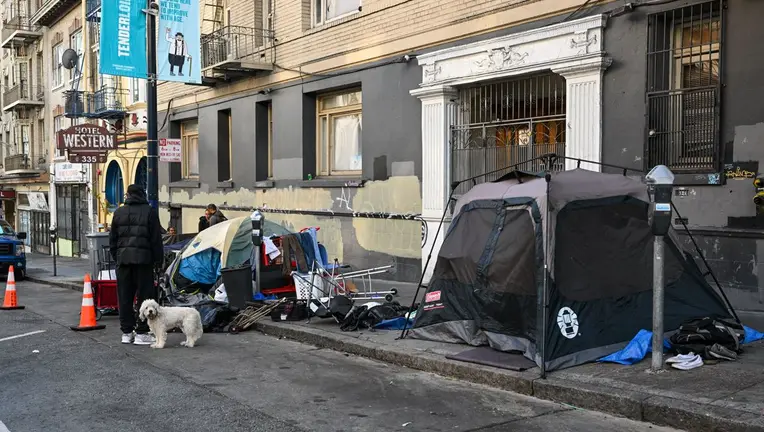Spending Bill Makes Significant Cuts to Direct Assistance for Those Living in Poverty & Nonprofit Programming
SAN FRANCISCO, July 7, 2025 – Today, Tipping Point Community announced that it will double its fundraising and investment over the next ten years. Tipping Point has raised over $500 million in the past 20 years, and plans to increase their fundraising and investment to over $1 billion in the next 10 years. The announcement comes on the heels of a federal spending bill that cuts direct assistance, and a massive budget deficit in San Francisco that leaves the Board of Supervisors poised to cut funding for nonprofits and grants by $185 million. Such cuts make it more difficult for people living in poverty to stay housed, obtain quality childcare and education, and get work that enables them to reach the middle class.
“Nationally and right here at home, the resources necessary to support those most in need are increasingly difficult to come by,” said Sam Cobbs, CEO of Tipping Point Community. “Tipping Point was founded on the belief that poverty is not inevitable—and for 20 years, this community has proven that when we invest in people and solutions, change is possible. We have demonstrated success, and that’s why we are accelerating our fundraising and investment to greatly expand our impact.”
Congress approved President Donald Trump’s Fiscal Year 2025 reconciliation bill, titled the “One Big Beautiful Bill Act.” The spending bill makes significant cuts to programs assisting individuals living in poverty, with estimates indicating cuts totaling over $1 trillion over a decade. As a result, nonprofits across the Bay Area are bracing for the sweeping implications, with funding cuts expected to shift the landscape of how nonprofits plan strategically, deliver services, and support their clients. The proposed cuts threaten to overwhelm these organizations, potentially leading to reduced services or closures, and leaving vulnerable communities without essential support.
“Higher education and financial aid enable low income kids to go to and finish college, and a college education is one of the most effective pathways out of poverty,” added Cobbs. “Critically, the cuts we’re seeing are not just to direct assistance to those already living in poverty, but also to programs that serve countless Americans. We must do more to support the most vulnerable among us, and Tipping Point is going to dig deeper than ever because individuals who receive support through federal programs that are cut or eliminated often turn to nonprofits like those in our portfolio.”
Key funding changes outlined in the federal spending bill, which are likely to reshape nonprofit operations in the Bay Area and beyond, include the following:
Supplemental Student Aid and Nutrition Assistance Program (SNAP)
Research funded by Tipping Point Community has found that SNAP kept over 100,000 Bay Area residents from dipping below the poverty line in 2023. Further research supported by Tipping Point found that government benefits like SNAP, Medicaid, tax credits and housing vouchers provide a crucial safety net for Bay Area residents.
In San Francisco County, nearly 100,000 individuals received SNAP benefits in 2022. This number has been steadily increasing in the past years, representing over a 100% increase compared to 2018. The recently passed reconciliation bill will reduce total federal SNAP spending by about $295 billion over the next ten years, with over half of federal savings coming from shifting costs to the states. The proposed $211 billion cut to SNAP—the largest in U.S. history—could result in the loss of 1.1 billion meals annually in California.
Further changes to current SNAP policy include expanding work requirements for those ages 55 to 64 and applying work requirements to parents of children aged 7 to 17, a group previously exempt. Through the implementation of this new legislation, the combined effect of changes is projected to reduce SNAP participation by a monthly average of 3.2 million people across the country. Research suggests that work requirements generally reduce participation in social safety net programs.
Proposed federal cuts to SNAP-Ed further threaten to eliminate nutrition education programs that serve approximately 90 million low-income Americans. Nonprofits relying on SNAP-Ed funding may have to discontinue various community health initiatives absent sufficient local, state, or philanthropic funding.
Student Aid and Higher Education
The spending bill reduces accessibility to higher education for low-income students by phasing out loan repayment options for new borrowers, including income-driven repayment “SAVE Plans”. SAVE Plans are designed to keep student loan payments reasonably affordable for recipients by capping payments at a percentage of a borrowers’ monthly income and offering a shorter timeline for debt relief.
The bill also limits the amount that graduate students can borrow and phases out the federal Grad PLUS loan program, making a postgraduate education less accessible for students who do not wish to take out private loans.
The Federal Reserve Bank of San Francisco estimated that there were approximately 735,000 Bay Area student loan borrowers as of 2018. Nonprofits that provide college access services, scholarships, and educational support to low-income students may struggle to maintain operations as repayment options begin to shrink for new borrowers.
Tipping Point-funded research shows that two-thirds of those with less than a four-year degree report difficulty making ends meet compared to just a quarter of those with a four-year degree or higher. Similarly, asset poverty is nearly twice as high among those with less than a four-year degree as compared to college graduates.
Housing Assistance
Research supported by Tipping Point shows that housing choice vouchers kept 77,000 Bay Area residents out of poverty in 2023. The number of housing units funded by Housing Choice Vouchers (also known as Section 8), or federal rental subsidies, has risen within the Bay Area since 2014, with San Francisco showing an even more dramatic increase when compared to the entire region. The San Francisco Housing Authority is not currently accepting new applicants for Housing Choice Vouchers due to concerns regarding the availability of federal funding.
The One Big Beautiful Bill will allow for the implementation of new time limits and work requirements as a condition of funding for federal rental aid and subsidies. HUD cuts are poised to jeopardize funding for affordable housing projects and services for the homeless in San Francisco, with the Department of Homelessness and Supportive Housing already informing grantees of possible reductions which would disrupt services for vulnerable populations.
###
Tipping Point Community (TPC) is a Bay Area-based nonprofit dedicated to advancing highly promising poverty-fighting solutions and critical services. Through targeted investments in housing, early childhood, education, and employment programming across the region, TPC works to cultivate community-driven nonprofit networks capable of creating opportunity and prosperity for the entire Bay Area community.





